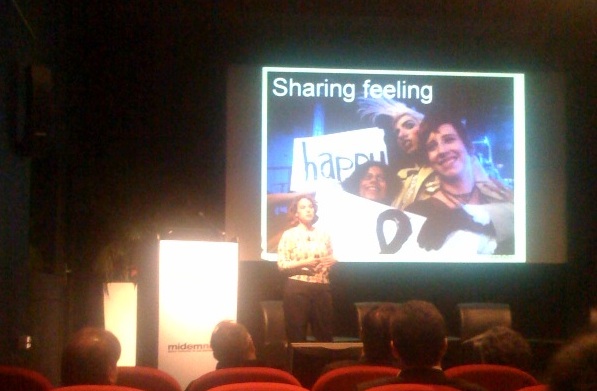What will happen to the music industry?
Friday, March 6, 2009
Since MIDEM, I have been reflecting a lot on the future of the music industry. As I wrote below, as an outsider, I was discouraged by what seemed to be backwards thinking regarding what I see as the great opportunities of the era of the networked audience.
Two posts today from Techdirt and the MIDEM blog question whether the recording industry is really ready to collaborate and cooperate with new services and fans or whether all that talk is just another PR campaign.
What struck me at MIDEM was that for all the sobbing or cynical snickering from those within the industry about the damage being done and the jobs and revenue being lost, I found that most of the time I was surrounded by really smart, really optimistic people who were creating new jobs, new revenue streams, and having a really good time doing well in the music business.
The thing was, all those people had accepted that the audience is irrevocably networked and that digital music is and will always be easily and freely shared. They were building businesses that use social media to turn people on to new music, to connect people to one another around music, and to provide comprehensible data analysis to the people making and marketing music. They weren’t in the old jobs working for record labels and publishing companies.
If I were a futurist, I would predict this future:
As the old industry behemoths focus more and more on controlling intellectual property, fewer and fewer artists will be willing to deal with the restrictions this places on their fans’ ability to build excitement around them. Rather than fearing the exchange of their music for free, or the propensity of fans to make their own videos and remixes, more and more artists will seek it out, realizing there’s plenty of money to be made giving the music away and selling scarcities (see Masnick’s Techdirt writings for long exegeses of this idea).
Third party companies and services on the internet will make it easier and easier for artists to spread their music and reap financial rewards outside of the sign-with-a-label/get-on-the-radio system. Eventually the recording industry as it stands now will become a small marginalized part of the industry as the people who understand that “protecting” intellectual property is a good way to kill your business, while sharing is a good way to build it decide it makes more sense for them to forego major label representation. To the extent that rights-holders opt in to a system that locks them into a protectionist-orientation, they’ll be increasingly irrelevant. To the extent that they bypass that increasingly restrictive system, they’ll thrive. Eventually there will be so many outside the system, what’s now fringe will be the norm.
Now I understand that it’s not reasonable to expect musicians to also be ace marketers and social media experts. The people at labels do real work, and I don’t mean to dimish that. The huge need is going to be a new kind of intermediary, not a label, not exactly a manager (though they’ll still be useful), but the social-media-advisor who can make sense of the many forms of media through which word is spreading, the many kinds of social activity through which those words flow, and guide the musicians’ media presence.
For those who say “but musicians should be able to make a living by charging people for the music, they shouldn’t have to do all that other stuff” I say, well yeah, in the perfect world. But this is the new world. Some people may still get away with that, but clinging to that historically brief past in which recorded music could be a primary source of income will only lead to obsolescence.
____
On a housekeeping note, I apologize to any readers who are bummed that I’ve been such an infrequent blogger. I find my thoughts these days are either happening in 140 character form or really long form (since my blogging slow down I’ve written four book chapters and two journal articles as well as a few talks). Blog post length seems either too long or too short. But I’ll keep trying.


 Next week I am headed to France to attend my first
Next week I am headed to France to attend my first